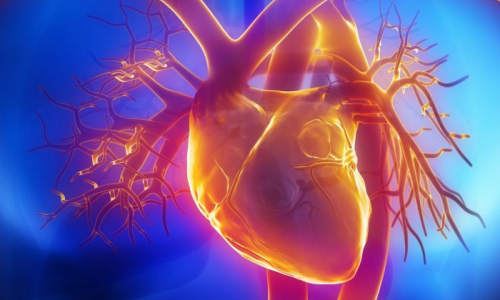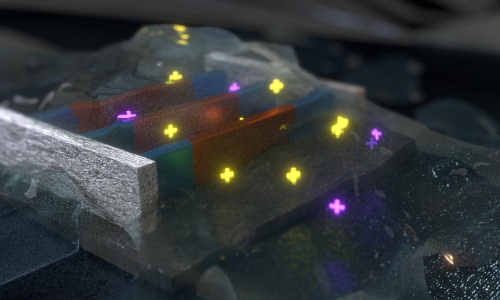For the first time in the world, a patient with a mechanical heart pump is taking part in a new gene therapy trial for heart failure.
Photo Credit: Imperial College
This is the start of a new clinical trial that will assess gene therapy for patients with heart pumps and provide detailed insight on its impact on the heart muscle.
Heart failure occurs when the heart no longer pumps blood effectively and it affects hundreds of thousands of people in the UK. Some individuals with an advanced heart failure can be fitted with a Left Ventricular Assist Device (LVAD), which supports the failing heart and aims to restore normal blood flow.
The LVAD is an electrically driven pump, moving the blood from the left ventricle into the main artery (aorta) so it can circulate the oxygen-rich blood to the rest of the body. Individuals with advanced heart failure who require a transplant may be fitted with an LVAD to keep them alive until a suitable donor heart becomes available. Currently there are around 100 to 150 people in the UK living with an LVAD.
The new trial, led by Imperial College London and funded by the British Heart Foundation (BHF) and Celladon Corporation, will explore whether this gene therapy could help these patients’ hearts recover and potentially provide an alternative treatment. It is the first study of gene therapy in this patient group. The work was initiated with support from the Leducq Foundation.
This particular gene therapy is designed to increase levels of SERCA2a protein in heart muscle cells. SERCA2a plays an important role in heart muscle contraction. Genes are inserted into the heart muscle cells to increase the level of SERCA2a using a harmless engineered virus that is based on a naturally occurring virus. In this study the research team will take small biopsy samples of the heart muscle six months after treatment to measure if the gene is present, detectable and functional in the patients’ hearts.
Professor Sian Harding, Professor of Cardiac Pharmacology and Head of the BHF Centre of Regenerative Medicine in Imperial College London, who helped develop the treatment, said: “We will be using state-of-the art methods to gain detailed information on how and where the gene therapy takes effect, which will potentially help us develop and improve the therapy. It’s important to remember that the therapy is not correcting a gene defect. We are working much more downstream, which means that no matter what the cause of the heart failure, the therapy should be equally beneficial for patients whether their heart problems stem from genes, lifestyle or the environment or a mixture of all of these.”
The research team plan to evaluate how this therapy works in 24 patients with advanced heart failure who are fitted with LVADs. Of the patients enrolled in the study, 16 will be treated with the gene therapy and eight will be treated with a placebo. Dr Nick Banner, the consultant cardiologist at Harefield Hospital who carried out the first gene therapy infusion, said: “Advanced heart failure is a progressive condition that results in a poor quality of life and shortened life expectancy. The best treatment currently available is a heart transplant but the shortage of donor organs in the UK means that many patients will die on the transplant waiting list.
“LVADs can keep some patients alive long enough for a donor heart to become available. The rationale for this study is to investigate the effectiveness of a new form of therapy, which might in the future be a viable alternative to transplantation. This study will help us better understand whether the concept of repairing a heart with gene therapy might be possible, even in patients with advanced heart failure. The patients taking part in the trial will have regular tests to see if there are any improvements in heart function.”
The new study will be the first to evaluate whether gene therapy is delivered to the heart muscle and if its effectiveness is compromised in patients with antibodies to the virus, which delivers the gene.
Previously patients with an antibody to the naturally occurring version of the virus (about 50-60 per cent) have been excluded from a larger ongoing CUPID2 trial, which is investigating the benefits of gene therapy in people with heart failure but no LVAD device. Patients were excluded because it was believed possessing the antibody would render the virus less effective at inserting the gene into the heart muscle. However the actual effect of the antibody has never been explored in patients. This new study will evaluate the effectiveness of the gene therapy in both those patients who have the antibody and those patients without the antibody in order to make a comparison.
“We have adapted the wild virus by removing the viral genes and replacing them with the treatment SERCA gene, so the virus acts like a biological courier to deliver our treatment gene,” explained Dr Alex Lyon, BHF Senior Lecturer, honorary consultant cardiologist at the Royal Brompton & Harefield NHS Foundation Trust and trial lead investigator from the National Heart & Lung Institute at Imperial College London. “This particular virus is advantageous because it is not known to cause any human disease. However this means many people have been exposed to the virus without developing symptoms and therefore possess antibodies. If we exclude this group, then potentially a substantial number of heart failure patients would not be eligible to receive this therapy. If we demonstrate that the antibody does not block the delivery of gene therapy, many more patients could benefit.”
The 24 patients in the trial, recruited from Harefield Hospital, London and Papworth Hospital, Cambridgeshire, will either receive the gene therapy or a placebo. Six months later a sample of tissue or biopsy will be taken from the heart muscle and examined in laboratories in Imperial College London. This will provide an exploratory analysis of how much of the SERCA2a gene and protein are actually getting into the heart muscle. For those patients on the trial who subsequently undergo a transplant the research team will also then be able to examine the whole heart. This will allow an investigation into how the therapy affects heart function and the underlying mechanisms such as electrical currents, calcium levels and structure of individual cells.
This trial complements the larger ongoing CUPID2 trial, also funded by Celladon Corporation, which is investigating the benefits of gene therapy in 250 people with less advanced heart failure from Europe and the USA, including 14 patients from the UK. Data from the CUPID2 trial is expected in April, 2015.
Story Source:
The above story is based on materials provided by Imperial College, Francesca Davenport.





